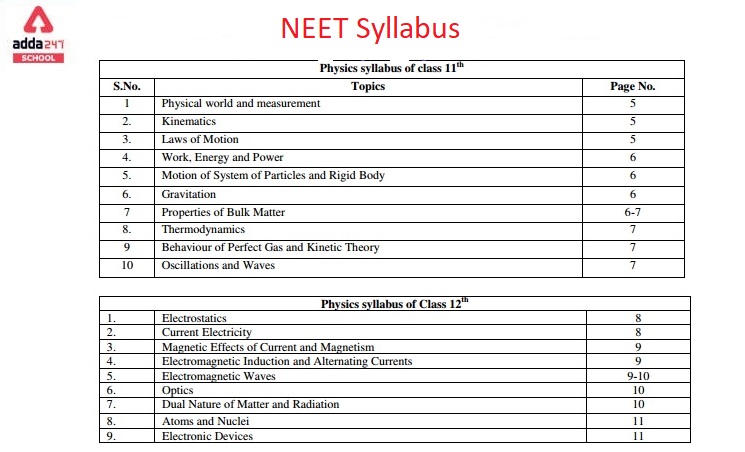The National Eligibility Entrance Test (NEET) is a highly competitive standardized exam conducted in India for students seeking admission to undergraduate medical programs in government and private medical colleges. The syllabus for NEET is vast and encompasses various subjects, including Biology. To stay updated and well-prepared, it’s crucial for aspirants to understand the changes in the NEET Biology syllabus.

The NEET 2024 Biology syllabus has undergone some modifications compared to the previous years. These modifications include the deletion and addition of certain topics.

Deleted Topics in NEET Biology Syllabus 2024:
- Structural Organization in Animals – Tissues:
- The detailed classification of animal tissues (Epithelial, Muscular, Nervous, and Connective)
- Digestion and Absorption:
- Structure and functions of the ileocecal valve, rectal glands, and anal sphincter
- Breathing and Exchange of Gases:
- Transport of oxygen and carbon dioxide by hemoglobin, including the Bohr effect and Haldane effect
- Body Fluids and Circulation:
- Mechanism of cardiac cycle in detail, cardiac output, heart rate, stroke volume, and blood pressure
- Regulation of blood pressure – role of renin, angiotensin, aldosterone, atrial natriuretic factor, and adrenaline
- Excretory Products and their Elimination:
- Structure and functions of nephridia in annelids
- Locomotion and Movement:
- Mechanism of muscle contraction, including the role of actin and myosin filaments and the sliding filament theory
Added Topics in NEET Biology Syllabus 2024:
- Molecular Basis of Inheritance:
- Genetic engineering – including methods and its applications and DNA fingerprinting.
- RNA interference (RNAi) and gene silencing
- Evolution:
- Mechanisms of evolution, including gene flow, genetic drift, mutations, natural selection, migration, and convergent evolution.
- Evolutionary history of life forms on Earth
- Ecology:
- Environmental Issues – Air pollution, Water pollution, and Solid waste management.
Aspirants should thoroughly familiarize themselves with both the deleted and added topics to ensure comprehensive preparation for the NEET Biology exam. It’s essential to refer to the official syllabus released by the National Testing Agency (NTA) for the most accurate and up-to-date information. Additionally, practicing with updated study materials, solving mock tests, and consulting with experienced educators can greatly enhance the chances of success in NEET Biology.[Updated NEET Biology Syllabus 2024, Deleted and Added Topics]
Executive Summary
The National Eligibility cum Entrance Test (NEET) biology syllabus for 2024 has undergone significant revisions, including both deletions and additions. The changes aim to better align the exam with current advancements in the field of biology and to continue assessing students’ understanding of fundamental biological concepts. The modifications in the syllabus cover various sub-topics within major units, introducing new subject matter while eliminating outdated content. This article provides a detailed analysis of the updated NEET 2024 biology syllabus, highlighting the key changes and offering insights to students preparing for the exam.
Introduction
The NEET biology syllabus consists of three primary sections, namely botany, zoology, and human physiology. The 2024 update introduces changes that collectively affect around 34% of the original syllabus, making it crucial for students to familiarize themselves with both retained and new content. It is important to note that while some topics have been omitted from the new syllabus, others have been modified to encompass updated knowledge and scientific discoveries.
Subtopics
Botany
- Diversity of Living World:
- Origin of Life: Understanding the fundamental concepts and different theories pertaining to the evolution of life on Earth.
- Classification of Living Organism: Studying the principles and hierarchical organization of various biological organisms.
- Microorganisms: Exploring the characteristics of microorganisms like bacteria, fungi, and viruses, including their ecological roles.
- Structural Organization in Plants:
- Plant Cell Structure: Delving into the structures and functions of plant cells, their components, and their roles in plant growth.
- Tissues, Tissues Systems, Organs, and Organ System: Understanding the organization of plant tissues and organs, their integration and coordination, and their contributions to overall plant function.
- Growth and Development: Exploring the processes of plant growth, differentiation, and development, including hormonal regulation.
- Reproduction in Plants:
- Asexual and Sexual Reproduction: Learning the mechanisms of sexual and asexual reproduction, including their advantages and disadvantages.
- Flower Structure and Pollination: Examining the structural components of flowers and the role of pollinators in the process of pollination.
- Fruit and Seed Development: Understanding the processes and intricacies involved in the formation and development of fruits and seeds.
Zoology
- Animal Kingdom:
- Animal Classification: Exploring the various levels and principles of classifying animals based on shared characteristics and evolutionary relationships.
- Animal Diversity: Studying the rich variety and adaptations found among different animal groups, such as invertebrates and vertebrates.
- Animal Behavior: Investigating the diverse behavioral patterns, communication methods, and adaptations employed by animals to survive in their environments.
- Structural Organization in Animals:
- Basic Tissues: Understanding the properties, structures, and functions of the four fundamental animal tissues: epithelial, connective, muscle, and nervous tissues.
- Integumentary System: Exploring the structure and physiological importance of the integumentary system, including skin and its appendages.
- Musculoskeletal System: Studying the components of musculoskeletal system, emphasizing the anatomical and functional characteristics of bones and muscles.
Human Physiology
- Human Health and Disease:
- Nutrition and Digestion: Delving into the process and mechanics of nutrient utilization by the human body, including digestion and absorption of various nutrient components.
- Respiratory System: Examining the structure and mechanics of respiratory system, emphasizing the process and mechanisms of gas exchange.
- Excretory System: Exploring the structure and functions of human excretory system, highlighting its role in filtration, reabsorption, and excretion.
Conclusion
The revised NEET biology syllabus 2024 presents a comprehensive and updated scope of biological knowledge for students preparing for the exam. The changes reflect the ongoing evolution of biological sciences and ensure that the curriculum remains aligned with the current understanding of life processes and principles. By thoroughly comprehending both retained and newly introduced concepts, students can enhance their understanding of biology and secure a strong position in the NEET examination.
Keyword Phrase Tags:
- NEET Biology Syllabus 2024
- Deleted and Added Topics
- Updated Units and Subtopics
- Botany, Zoology, and Human Physiology
- Changes in Coverage and Content



